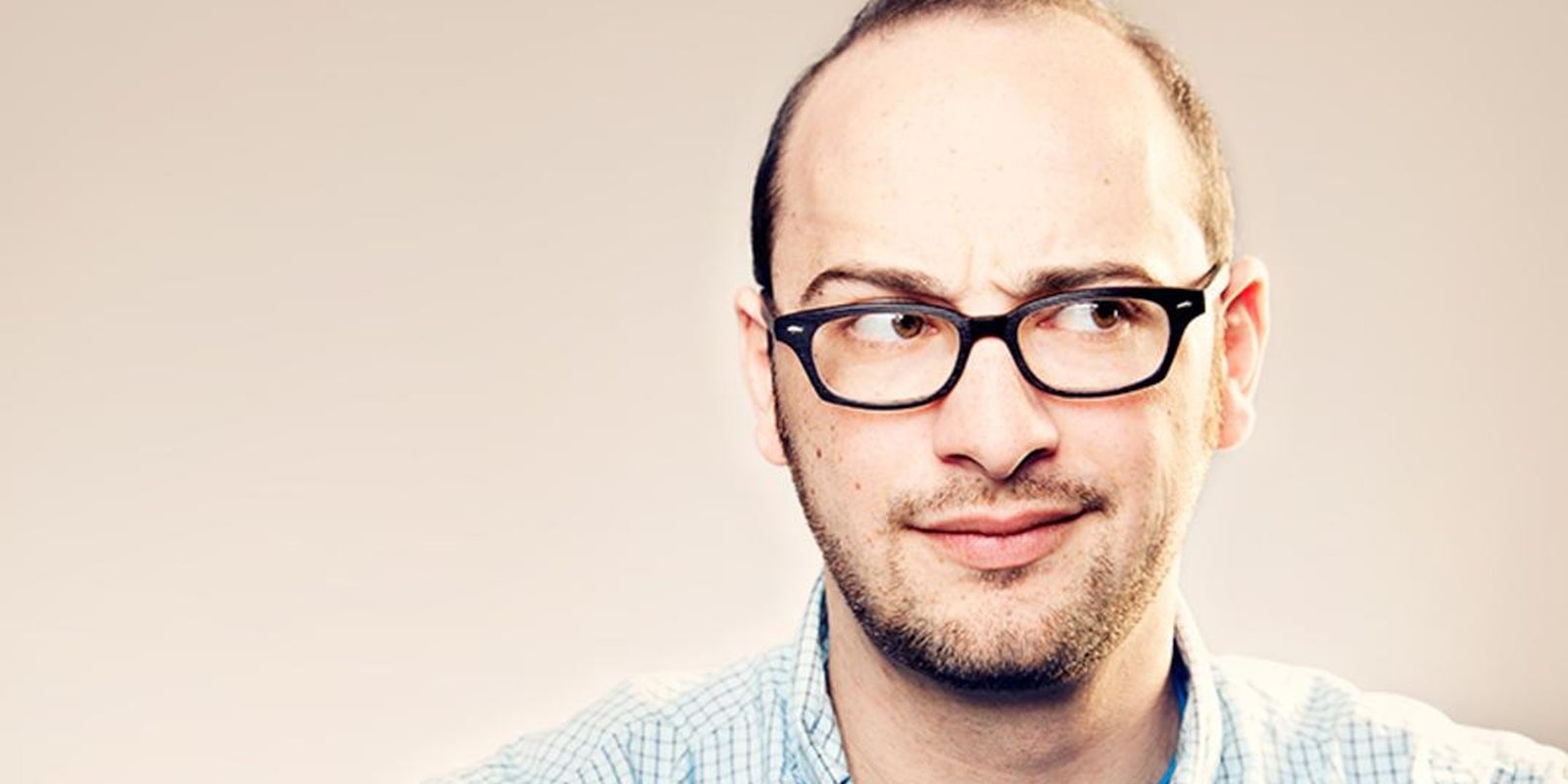Some comedians don’t take shit from anyone. Josh Gondelman is truly an exception. In fact, he’ll hold your shit if you hand it to him and ask nicely.
Gondelman recently hosted a release party in Los Angeles for his new album, Physical Whisper, the title of which comes from a joke about kissing his girlfriend. He’s self-reflective about his niceness, however, which was evident when he brought his friend, comedian Cy Amundson, on stage. He said he admired a guy who “doesn’t take shit.” In turn, Gondelman characterized himself as a guy who does: “If someone came up to me and handed me a bag of dog shit, I would politely take it and say thank you,” he said on stage.
Shit jokes aside, the Brooklyn-based Gondelman is actually killing it right now; he hosted this show in L.A. just hours after making his debut on Conan. His comedy career began on Twitter in 2011; he was getting ready to make his move to New York from Boston, where he worked by day as a preschool teacher.
“I was doing standup but that only happened at night, and if I had a 15-minute short break, there wasn’t that much I could do,” Gondelman told the Daily Dot. “So it was nice to have a little comedy outlet during the day.”
Recently, what began as a tweet about the void endorsing Donald Trump spun off into every possible void-like Trump endorsement. In the process, people joined the joke parade, bringing a participatory feel to the experience.
The void has endorsed Donald Trump.
— Josh Gondelman (@joshgondelman) February 28, 2016
It’s this sort of feel that got people into his @SeinfeldToday Twitter account, which reimagines the cast of Seinfeld dealing with additional neuroses caused by technology, or his similarly punchy book You Blew It!: An Awkward Look at the Many Ways in Which You’ve Already Ruined Your Life. Gondelman’s prolific tweeting even led to his current job as a writer for Last Week Tonight with John Oliver, where he’s known for hilarious bits such as this one about pumpkin spice.
Gondelman also gives back to the beautiful Twitterinos with his “pep talks,” which usually happen between 11pm–1am and last for 15-30 minutes. They involve Gondelman saying nice or encouraging things to people who express that they’re having a bad day, or just need a little pick-me-up before hitting the sack or while they’re out on the town.
“I usually think to do pep talks on Twitter if I’m on the road, at home and my girlfriend is out of town, or if I’m at home and up later then my girlfriend and our dog Bizzy—like if they’re both asleep but I’m kind of wired,” he explained. “It usually comes from a place of, ‘Oh, I’m isolated from people,’ and rather than asking someone to do something for me, it feels better to offer a small kindness to someone else. And it’s less lonely. Other times it comes from a place of gratitude and abundance. Or it could be a time when something is going really well and I want to share that. But rather than being like, ‘I’m crushin’ it right now!,’ it’s nice to be like, ‘Hey, I’m feeling good, but maybe you’re not?’”
In this way, Gondelman hints at many of the intentions behind being performative on social media. It’s a way to connect and say hello, but also to be passive in a quest for contact because online, behind screens, one can only communicate through words and images.
Gondelman is a comedian, not a therapist, but much of his comedy has that same sort of feel-good-about-yourself vibe—it comes from a loving place, which is often a fine line comedians have to walk when they’re gently poking fun at people they love. In one of his jokes on Physical Whisper, he makes fun of his nana, who is very old and unknowingly says racist things.
“A lot of people give old people a bad rep, a lot of people say old folks are racist,” Gondelman said as he opened the joke on stage. “I don’t think old people are any more racist than you or I. I just think that they think they’re still whispering.”
At the punchline, giant laughs erupt from the audience. Gondelman waits before moving on:
“I’ll be out in public with my grandmother and she’ll say something well-meaning but atrocious, like, ‘Joshua, look at that Oriental couple.’ [And then I think], ‘Oh dear god, Nana. You need to turn up your hearing aid because we’re in public and the future.’”
The joke then takes a hilarious turn, with Gondelman trying to help his grandmother adopt new language that is just funny rather than corrective.
“Every time she screws up, I give her a new word to bring her into the 21st century,” he explained.
His comedy comes from a place of compassion, much like his contemporary Maria Bamford, who has countless jokes about her family members. But unlike Bamford, who performs a more surreal kind of storytelling, Gondelman is matter-of-fact and rather logic-based in the way he breaks down more difficult subject matter, especially topics like race, homelessness, and gay rights. There’s a sense of honesty that feels relatable.
“I’m a big fan of saying the thing that is not necessarily sincere or earnest, but definitely honest,” he explained.
When asked to explain what that means, he replied with the most thoughtful answer.
“Honest doesn’t necessarily mean unfiltered,” he said. “What I try to do, what I attempt to do, is say things that I mean at least at an emotional level. Try to convey the truth of, ‘This is how I feel about this,’ and to do that earnestly isn’t the same as doing it honestly, because earnestness implies a guilelessness that I think you can’t have if you’re trying to sculpt the material in a way that is effective comedy.”
Photo by Mindy Tucker


